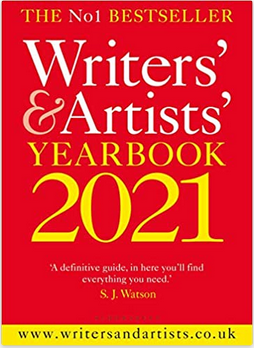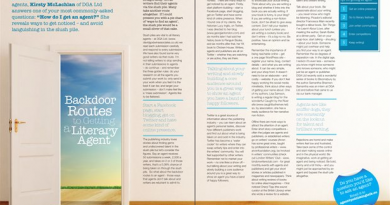How to get a literary agent – 7 steps to success

If you want to land a publishing deal, you’ll need a literary agent first. Here’s how to go about getting one.
[rt_reading_time label="Reading Time:" postfix="minutes" postfix_singular="minute"]
Do you dream of being a published author? Want to see your book on the shelves of your local bookshop, have your work read by legions of appreciative fans, and be fêted at literary festivals? For such dreams to come true, first you need to land a publishing deal. And, before that, you need to get taken on by a literary agent. Where do you start?
Learn more about submitting to agents on Scott Pack’s next masterclass: How to Perfect Your Submission to Agents and Publishers – online, Weds 15th Sep 2021, 6:30pm UK time (BST).
How to get a literary agent – at a glance:
- Finish your novel
- Do your research
- Write a synopsis
- Prepare your sample chapters
- Write a query letter
- Submit to literary agents
- Get an offer of representation!
This article focuses on fiction authors, who absolutely need a literary agent in order to be considered by a publisher (you don’t always need one for non-fiction). Follow these steps to give yourself the best chance.
1. Finish your novel
This sounds conterintuitive. Because, when you submit to an agent, they usually only want to see a writing sample. Maybe a couple of chapters. Or three. So why write the whole thing? Why not get an agent, a publishing deal and a juicy advance first, so you have the time and money to actually write the thing?
Because, if you’re successful, and the agent you submit to likes your material, the very first thing they’ll ask is to see the whole thing! If you haven’t actually written it yet, you’ll just annoy them. Yes, the process of submitting and landing an agent can take a while. But what if you strike gold on your first attempt? Be prepared!
2. Do your research
 The other way you need to prepare is with your research. If you’re in the UK, The Writers’ & Artists’ Yearbook is your friend. In the US, Writer’s Market is the equivalent publication. These annual directories list all the publishers and literary agents you could possibly want to submit to – along with their interests, submisison guidelines and contact details. They also include advice and articles on getting published.
The other way you need to prepare is with your research. If you’re in the UK, The Writers’ & Artists’ Yearbook is your friend. In the US, Writer’s Market is the equivalent publication. These annual directories list all the publishers and literary agents you could possibly want to submit to – along with their interests, submisison guidelines and contact details. They also include advice and articles on getting published.
Research the right literary agent for you. Look through these books. Go onto agents’ websites and look at their client lists. Check out what sort of books they’re interested in. See what their clients have recently published. Which books are similar to yours? Read one of them. Be informed about your potential new agent’s interests before you approach them.
Then make a list of agents you want to submit to. Who would be your dream agent? Put them at the top of the list!
3. Write a synopsis
There are three things you need: a synopsis, sample chapters and a cover letter (or ‘query letter’). Let’s start with your synopsis. Write out everything that happens in your novel, in the order in which it happens, in the present tense. Keep it to no more than two pages (ideally one).
And don’t hold anything back – let us know how your story ends! You may have intriguing twists, turns and reveals in your novel that you want to hold back from the reader – but don’t do this with your prospective agent. This is no time to be coy or worry about spoilers. You can still build tension in the way you write your synopsis, and keep the reader intrigued. Do this by only revealing plot points at the correct time in your synopsis. So don’t say: ‘…and he later turns out to be the killer all along’ in your opening paragraph. Save that information until the part of the story when it is revealed to the reader. Then your synopsis can be as engaging and satisfying as the full book.
A good place to research how to write synopses is Wikipedia. Look up a favourite novel – or film – and read the summary. Even the most complex novels can be sumarised briefly in the present tense without leaving anything out.
4. Prepare your sample chapters
The purpose of your sample chapters is to flesh out some of your synopsis and, importantly, to demonstrate your writing style. An agent wants to see that you can write – or at least have potential. A couple of sample chapters is usually sufficient – but it depends on the submission guidelines of the agents on your list. Your research in step 2 will help you not only identify suitable agents, but tell you what they want you to submit – and how. Many only accept submissions by email these days, for example. Some may want one chapter, some 10,000 words, some the whole book. It depends.
One important thing to bear in mind is that, whether your prospective literary agent wants one chapter or three, they must be the first chapter, or the first three chapters. You may be writing your book out of order (I certainly do this). You may think chapter 12 shows off your writing best. But it MUST be the first chapter(s). You must be able to hook a reader in your opening pages – and your most important reader is your agent.
First chapters are hard. You need to get us straight into the action, hold a reader’s attention, introduce your main character, explain what your book is about (without too much exposition – show, don’t tell), articulate your theme, make us care about your protagonist and the problems you set for them, hint at what’s to come, and show that you can write compelling prose in a unique voice. Phew!
But first chapters are also great to write. They’re an opportunity to set out your stall, show what you can do, confound expectations, surprise the reader, be audacious. If there’s a question at the heart of your novel, be sure to ask it in the first chapter! Your first chapter should give a tantalising taste of what’s to come if you read the whole novel. This is why your prospective new literary agent wants to see it. Hook them in.
5. Write a query letter
A query letter is a one-page sales letter that you send to a literary agent to pitch your book and ask them if they would be interested in representing you. The ‘query’ is: “Will you be my agent?” And the ‘letter’ probably isn’t a physical one, or even an email attachment. It’s more common to put this into the body of an email.
You might send your query letter as an email, with your synopsis and sample chapters attached as Word documents. But always check the submission guidelines. Some agents may prefer an email (without attachments) first – and they’ll let you know if they want to see more. This is why your query letter is so critical.
Be sure to personalise each letter. Use the agent’s name (spelled correctly!) and include:
- Why this agent? A short paragraph about why you’ve chosen to approach this particular agent. Do you love the work of one of their clients? Does their website indicate that they’re particularly interested in your niche genre? Did you meet them once at a literary event? Do you follow them on Twitter?
- Blurb. An enticing paragraph of blurb ‘selling’ your book, and setting out its overall concept. Specify the genre, and who it’s aimed at – e.g. contemporary women’s fiction, techno thriller, young adult, comedy political thriller.
- About you. A line or two about yourself, and any writing credits you have. Maybe something on your ‘platform’ – i.e. your existing (online) audience, if you have one.
Your query letter is, in many ways, the most important part of the package – because you want to grab your chosen agent’s attention and persuade them that reading the rest of your submission is worth their time.
6. Submit to literary agents
You tend only to get one shot when submitting to a literary agent. If they don’t like your submission, you’ll most likely have to try elsewhere rather than make changes and re-submit. So give it your best shot each time.
Work your way through the list you generated in your research phase – starting with your dream agent and working down. You can approach several agents at once – it’s sort of expected. It may take three months for an agent to reply to you – and you can’t wait around that long. Send out queries to up to six of them at a time. This will help you guage responses. If you get no requests for further material, your query letter needs work before you send it out again!
Keep track of what you’ve sent to whom and when. Log it all in a spreadsheet, along with details of any responses. You’re likely to get one of these responses to your query letter:
- A rejection
- No response at all (usually also a rejection)
- A request for more material
- A request to see the whole manuscript.
The last two of these responses may subsequently also result in a rejection. Don’t give up. Sometimes an agent will reject you simply because their list is full. Or they might think your book isn’t the type of book they can sell to publishers. You might get some feedback on your submission. More often you’ll get a standard rejection slip. Don’t take offence – agents are busy people and get a lot of submissions. If you hear nothing, follow up with a polite note after 6-8 weeks.
And don’t argue. If you get a rejection, be grateful for any feedback offered, accept it with good grace and move on to the next agent on your list.
It may be your writing that needs work, rather than your query letter, if you get several requests to see sample material but then get rejections. Seek more feedback – maybe by joining a writing group. Re-work it and try again.
However, if an agent is interested in you and your book, the next step is a meeting with them to discuss it. And then, possibly, an offer of representation. But be aware that every stage of this process can result in rejection. If you’re offered a meeting, it doesn’t mean the agent will definitely take you on. But they might.
7. Get an offer of representation
Congratulations! Getting an agent is, understandably, the most exciting step for many aspiring authors. Finally the doors to the publishing industry have been thrown open to you – big advances, bestseller lists and literary prizes await!
Well, maybe. But don’t get carried away just yet. And don’t let your head be turned by the first agent who offers to represent you. Landing an agent is, understandably, seen as the Holy Grail by many an aspiring author. It’s easy to get carried away with excitement and gratitude and accept an offer – any offer – from the first person who shows an interest in you.
Don’t underestimate your value as a new writer. Debut fiction is very saleable! If you have more than one expression of interest, weigh up the pros and cons of each, ask questions, and be honest with yourself about what’s important to you. Crucially, do you get on with this person? So much of the publishing industry is based on personal relationships – and the author-agent one is a critical one.
Keep it professional, make sure your prospective new agent is the right agent for you – and your book. Meet the agent. Be prepared to talk about your writing – and what books you like reading – but also ask questions. Ask about how they work with clients. Do they offer editorial support, or are they more of a deal-maker? Ask which books they’ve done well with – and what their terms are.
Every agent is different, and works differently. Some are new and eager to build their list. Others are established with a portfolio of famous clients. You may prefer one who is part of a large agency. Or a sole trader with a small client list who can give you more attention may suit you better. This post gives a useful overview of seven different types of literary agent:
- How to choose an agent – which of these 7 types is right for you? by Kirsty McLachlan
Don’t let yourself be pushed in a radically different direction, if that’s not what you want. Occasionally you might pitch your book to an agent, but find that they want you to write something very different. They may like your style, but think that another type of novel is more saleable. An agent may sometimes even have a specific project in mind that they’re looking to get published – and are looking for someone to write it. Tread carefully. The agent may be right – they know the market, after all. But it’s your book – and you must write the book that you want to write.
The best agents will not only help you get published, they will manage your career, help you develop as a writer, and think about your long-term potential as an author. Ideally, this will be a long-term working relationship – so pick one you’re fairly sure you can work with. It is possible (and sometimes desirable) to switch agents later – though it’s a bit awkward and can get messy with the rights in your earlier books. So it pays to spend a bit of time and effort into making the right match – for both of you.
Once you accept an offer, the next stage is to sign an Agreement with your new agent (here’s what you need to know) – and for them to start working for you. Your publishing deal awaits!
Learn more about submitting to agents on Scott Pack’s next masterclass: How to Perfect Your Submission to Agents and Publishers – online, Weds 15th Sep 2021, 6:30pm UK time (BST).



